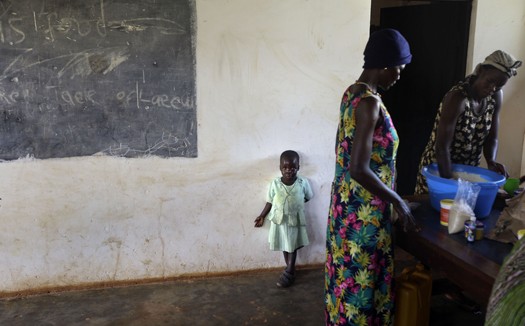More than six years after the war in Uganda came to a formal end, the country has taken a landmark first step by unanimously adopting a resolution that opens the door to the country’s first gender-sensitive reparations fund.
The resolution—adopted unanimously by parliament on April 9, 2014—urges the government to provide reparations for both women and men who were subjected to violence by the Lord’s Resistance Army (LRA) in northern Uganda, and calls upon the government to take robust action to remedy the plight of thousands of victims still in need of assistance.
“With this resolution, Uganda sends a clear signal that it is finally ready to take concrete action on its previous commitments towards ‘promoting redress’ and reconciliation across Ugandan society,” explains Michael Otim, ICTJ Head of Office in Uganda.
The resolution was the first acknowledgment by the Ugandan parliament of the need for institutional support to facilitate healing and justice for women, and comes after several years of delay.
“The very fact that the term ‘gender sensitive reparations’ is used is very encouraging for us” said Amrita Kapur, Senior Associate with ICTJ’s Gender Justice program.
“Oftentimes, an analysis of women’s experience in conflicts—such as the one in Uganda— is limited to sexual violence. By promising to consider all the ways that women—and men—experience conflict, this reparations fund can also address conflict-related harms that have a gender dimension, such as land dispossession, lack of access to education, stigma of victimization, and economic disempowerment," she said.
Designing Reparative Justice
After formal hostilities between the LRA and the government of Uganda ended in 2006, thousands were left with deep emotional and physical scars. In the 2007 Juba Agreement on Accountability and Reconciliation, Uganda committed itself to 'promoting redress'; however, apart from sporadic cash payments to a few victims, government action has yet to translate into concrete action.
These continual stalls help illustrate why the central components of the new resolution mark a significant step forward: it calls on the government to create a gender-sensitive reparation fund to address the needs of both women and men affected by the LRA. These reparations would prioritize services for victims such as healthcare, skills training, and education.
The resolution also recommends expanding the budget to incorporate additional free health services for victims, specifically in the realms of reproductive health, orthopedics, and psycho-social support. it suggests empowering regional governments affected by LRA violence in their efforts to identify and integrate children born or abused in captivity. Additionally, it urges the government to make a robust attempt to identify, integrate, and resettle child victims and women who were abducted during the war.
The inclusion of specific consideration to gender in the reparations fund is the result of a hard-won victory of grassroots organizing among women in Ugandan civil society. The Women’s Advocacy Network (WAN)—with technical assistance from ICTJ and the Justice and Reconciliation Project—created a petition and used it to mobilize national women’s rights organizations across the country, including the Ugandan Women Parliamentarian’s Association.
ICTJ’s Kapur recalls the scene while the resolution was passed. “It was a very emotional moment,” she said. “Many victims of the LRA violence were in attendance. One woman expressed to me how moved she felt to be there, to see the direct results of community action, and take back charge over her life.”
One of the victim advocates present during the debate on the resolution stated, “Today my healing has begun.”
Ensuring Implementation
After the resolution passed, the Deputy Speaker of Parliament appointed a committee monitor to inform parliament about the government’s progress to implement the resolution.
“The passage of the resolution on “gender sensitive” reparations is a great first step, but much is yet to be decided in regards to design and implementation,” said Ruben Carranza, Director of ICTJ’s Reparative Justice program. “While a positive indicator, this is by no means an assured success. It is critical that civil society remain vigilant in order to ensure that the final manifestation of the reparations program is not watered down by politics.”
In the 2012 ICTJ report entitled Unredressed Legacy: Possible Policy Options and Approaches to Fulfilling Reparations in Uganda, ICTJ offers a framework for discussing reparations if State and survivors were to directly engage with one another. The framework takes into account lessons from early humanitarian assistance work in the north among donors and NGOs, as well as the capacities and resources available in government development programs.
The next step, says ICTJ’s Michael Otim, is for the government to proactively engage civil society to design the fund.
“It is the State’s obligation to reach out to survivors and victims,” he said. “Not the other way around.”
Find ICTJ's research on transitional justice in Uganda here
Photo: Adye Sunday, 25, right, who was abducted when she was 13 by Lord's Resistance Army (LRA) leader Joseph Kony and forced to be one of his dozens of "wives" and says he's also the father of her two children, one of whom Betty, 3, stands at left, prepares food to sell at a center set up to help those who have left or fled the LRA, in Gulu, Uganda.2012 (AP Photo/Ben Curtis)
